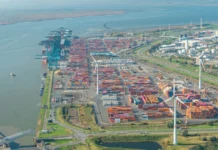
A.P. Moller – Maersk is proceeding with the deployment of its next-generation Internet of Things (IoT) connectivity platform, OneWireless, across its fleet, including all its owned vessels and more than 100 time-chartered ships.
The platform is designed to meet the increasing demand for real-time data transmission and provide advanced IoT capabilities, according to the company’s statement.
“With our next-generation connectivity platform, we will be able to offer our customers notable benefits, including real-time cargo tracking, enhanced supply chain visibility, and improved operational efficiency. This platform is designed to support thousands of IoT devices, ensuring optimal performance for reefer tracking and fleet IoT,” commented Kjeld Dittmann, Head of Vessel & Cargo Connectivity at Maersk.
Through the Captain Peter solution, Maersk customers can already monitor the temperature of their reefer cargo, but the current 2G network infrastructure onboard limits the frequency of data point updates. With the roll-out of OneWireless, this infrastructure is transitioning to 4G technology, enabling an increase in data granularity.
Dittmann added: “This upgrade to our IoT infrastructure is comparable to the shift consumers experienced when moving from 2G to 4G mobile networks. Just as that transition brought faster speeds, better connectivity, and new possibilities for our everyday lives, the OneWireless platform transforms how it is possible to communicate with cargo aboard.”
The OneWireless platform is a single, unified network designed to support multiple wireless technologies (NB-IoT, Cat-M, and LTE broadband), offering scalability, security, and flexibility, enabling Maersk customers to integrate their IoT devices and services.
The solution is designed for seamless interoperability between private and public networks, ensuring Maersk customers’ cargo is reliably monitored whether at sea, in port, or on land, thus enabling BYOIoT (bring Your Own IoT) solutions based on standards for customers.
The platform’s technology is the result of a blend of advanced components, selected through close collaboration with leading tech partners, including Onomondo, Nokia, 42com Sat, Complea, and Zededa.
The platform roll-out has begun and is on track for completion by the first quarter of 2026.
Maersk noted that since the upgrade involves hardware replacements aboard vessels, the process demands careful planning and must be executed during scheduled port calls.




